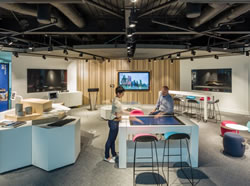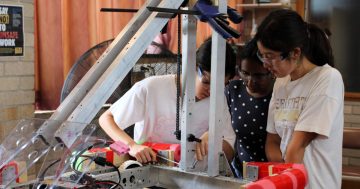Laura Stack* takes a peep into the future and suggests trends that will keep workplaces changing over the next few decades.
 Knowledge workers have experienced enormous change in the past 50 years.
Knowledge workers have experienced enormous change in the past 50 years.
We’ve transitioned from typewriters, landlines and snail mail to computers, cell phones and email.
These advances have profoundly changed both our personal and professional lives – skyrocketing productivity and capacity.
Right up until the mid-1970s, few prognosticators anticipated the computer revolution.
Even science fiction writers who had people colonising space by the 1990s had them using slide rules.
(If you need to look up ‘slide rule’ you must be a child of the Electronic Era.)
Not until the mid-1980s did everyone realise home computers were the next big thing and only after Y2K did futurists stop insisting the internet was just a fad.
So, clearly, predicting the future more than a few years out is tricky.
That said, short of unexpected breakthroughs, it’s easier to predict what’s likely to happen in workplaces within the next few years.
Let’s look at a few predictions.
Increased automation of everyday tasks: This has already started, though mostly in subtle ways.
Either free-ranging robotic assistants are much harder to implement than expected, or the Terminator possibility has scientists dragging their feet.
Experts expect the advances to come in the form of artificial intelligences (AI) that integrate data many organisations already collect but don’t use well.
Organisations can also use these digital platforms to handle tasks like scheduling, benefits, and time-off requests automatically, flagging tougher decision for human review.
Clearer data flow may also result in better decision-making by human managers.
The expansion of the gig economy: As many workers elect to become independent entrepreneurs (and possibly as automation eliminates some jobs).
Musicians have worked gigs for centuries, but now other creatives like writers, artists, and coders can do it too.
Many have done so for about 20 years now.
The options and platforms, however, will continue to grow, with more organisations preferring to hire freelancers for specific tasks rather than keeping specialists on hand.
Further decentralisation of businesses:
I’ve written about this trend in the past, comparing the existing workplace model to a hive of honeybees.
This compares the decentralised model to mason bees – top pollinators who work alone.
This trend may result in people working from anywhere they want, furthering the evolution of what some observers have called ‘digital nomads’.
These are workers who travel when and as they please.
At the very least, we’re all likely to have the opportunity to work as we like, keeping our jobs as long as we can produce.
More virtual workers:
This comes despite the relatively recent backlash of executives who felt workers were taking advantage of telecommuting.
Former Chief Executive of Yahoo, Marissa Mayer put an end to telecommuting even though she had a nursery built onto her office for her own child.
Her actions showed not only an indifference to her employees’ concerns, but also a lack of trust.
This can result in disengagement and can tempt talent to go elsewhere.
Virtual work is going to increase in importance in the future, especially for smaller businesses since they now have a global reach that allows them to find and retain good workers.
This may also force organisations that have abandoned telecommuting and virtual work to allow it again.
Email’s end:
This would be nice, but I’m not sure it’ll ever happen.
Some observers suggest – optimistically – that automation, AI platforms and other digital platforms will increase efficiency, preclude time-wasting meetings and cut back on office email.
The predictions outlined above stem mostly from the increased simplicity of data access and transfer, which continues to revolutionise all aspects of business.
Combined with younger workers’ disdain for the way some businesses have treated their elders, this has also triggered a social revolution.
Such workers may be great at what they do, but they often focus on their own improvement rather than that of their organisation.
For better or worse – with near-ubiquitous access to the ‘technosphere’ – they can have their employment cake and eat it too.
*Laura Stack is a keynote speaker, bestselling author, and authority on productivity and performance. She can be contacted at http://theproductivitypro.com/blog
This article first appeared on Laura’s blogsite.











